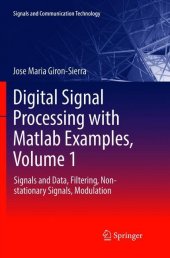 Neuerscheinungen 2018Stand: 2020-02-01 |
Schnellsuche
ISBN/Stichwort/Autor
|
Herderstraße 10
10625 Berlin
Tel.: 030 315 714 16
Fax 030 315 714 14
info@buchspektrum.de |

Jose Maria Giron-Sierra
Digital Signal Processing with Matlab Examples, Volume 1
Signals and Data, Filtering, Non-stationary Signals, Modulation
Softcover reprint of the original 1st ed. 2017. 2018. xxxvii, 622 S. 281 SW-Abb., 186 Farbabb. 235 mm
Verlag/Jahr: SPRINGER, BERLIN; SPRINGER SINGAPORE; SPRINGER 2018
ISBN: 9811096422 (9811096422)
Neue ISBN: 978-9811096426 (9789811096426)
Preis und Lieferzeit: Bitte klicken
This is the first volume in a trilogy on modern Signal Processing. The three books provide a concise exposition of signal processing topics, and a guide to support individual practical exploration based on MATLAB programs.
This book includes MATLAB codes to illustrate each of the main steps of the theory, offering a self-contained guide suitable for independent study. The code is embedded in the text, helping readers to put into practice the ideas and methods discussed.
The book is divided into three parts, the first of which introduces readers to periodic and non-periodic signals. The second part is devoted to filtering, which is an important and commonly used application. The third part addresses more advanced topics, including the analysis of real-world non-stationary signals and data, e.g. structural fatigue, earthquakes, electro-encephalograms, birdsong, etc. The book´s last chapter focuses on modulation, an example of the intentional use of non-stationary signals.
Part I Signals and data: Periodic Signals.- Statistical Aspects.- Part II Filtering: Linear Systems.- Analog Filters.- Digital Filters.- Part III Non-stationary signals: Signal Changes.- Time-Frequency Analysis.- Modulation.
Prof. Jose M. Giron-Sierra was born in Valladolid, Spain. He received his Ph.D. in Physics from the Universidad Complutense de Madrid, Spain, in 1978, and has authored more than 160 publications in various international journals. He is a member of the IEEE, AIAA, and Eurosim, and serves on two IFAC Technical Committees.


